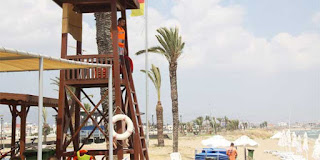CYPRUS: Green Line Regulation not fit for purpose
As reunification talks seem to be going nowhere, confidence building measures (CBMs) to rebuild trust like Green Line trade has also stagnated.
By Kyriacos Kiliaris
(As published in the Financial Mirror)
One of the most important CMBs in encouraging people-to-people contact is trade through the EU Green Line Regulation but figures are significantly lower than 10 years ago.
(As published in the Financial Mirror)
One of the most important CMBs in encouraging people-to-people contact is trade through the EU Green Line Regulation but figures are significantly lower than 10 years ago.
While the Green Line Regulation, implemented in August 2004, seemed to be a promising step, figures for products sold by Greek Cypriots to Turkish Cypriots have remained stable for a decade, while sales of Turkish Cypriot products to the south have plunged.
While stakeholders on both sides of the divide agree that trade between the two communities is probably the most important CMB which could lay the groundwork for peaceful coexistence in the +future, trade figures could be a lot better.
Since its introduction in 2004, Greek Cypriots have sold products worth a total of EUR 14 mln to traders in the north of the island, while Turkish Cypriot products worth EUR 54 mln have passed to the south.
An amount considered by analysts and stakeholders as poor, given that Greek Cypriot sell only EUR 1 mln worth of goods on average each year, while Turkish Cypriots sell EUR 3.85 mln.
Turkish Cypriots feel that limitations applied to their products allowed through the Green Line is undermining the regulation’s mandate. Currently, mostly fresh produce and raw materials occupy the list of items being traded.
Izzet Adiloglu of the Turkish Cypriot Chamber of Commerce (KTTO) told the Financial Mirror that restrictions on products such as processed food is hampering the regulation’s true potential. The official said that the trade of processed foods is not allowed as the Greek Cypriots want to see health controls applied to the products which certify they are EU standard.
According to the KTTO, the problem could be solved easily with the introduction of a control mechanism set up by the European Commission such as the one introduced for the fresh fish trade.
“Specialists are sent by the EC periodically to perform checks on the vessels and the spots where they are treated and cleaned. A similar mechanism exists for fresh produce with an EC mechanism issuing phytosanitary documents,” said Adiloglu.
“Certainly, one can be applied for processed food but unfortunately the matter is stuck as the Greek Cypriot side do not consent to such a mechanism,” he added.
He said that fresh fish was not included in the original list of products allowed but was added in 2007.
According to data provided by Finance Minister Harris Georgiades while replying to a question posed by Greens MP Giorgos Perdikes, almost EUR 800,000 worth of fresh fish has been sold to Greek Cypriots in 2017.
Prejudice
The KTTO official said that another factor taking its toll on trade between the two communities is the prejudice against products from the north.
“This is a problem, especially for Turkish Cypriots. There is a lot of pressure exerted on Greek Cypriots who buy products from the north, and as a result, a lot of businesses choose not to stock their shelves with Turkish Cypriot products.”
“Just the other day we saw a big order for potatoes being cancelled as the Greek Cypriot buyer could not withstand the pressure from the society and has declared that he will no longer be doing business with Turkish Cypriot producers.”
Mete Hatay, a consultant at the PRIO Cyprus Centre, and researcher who has been following Green Line trade over the years feels that whereas the regulation should have been the pillar on which inter-dependence of the two communities should have been built, has led to repercussions due to the lack of proper control.
He said the regulation came as a breath of fresh air for many Turkish Cypriot producers, however, there were cases where instead of promoting cooperation, it has actually fed the resentment between the two communities.
Hatay referred to the potato trade saying: “Because of the already existing prejudice, Turkish Cypriot potatoes are not preferred by Greek Cypriots. So Turkish Cypriot producers lower their prices, which causes unfair competition for the Greek Cypriot producers, thus increasing their resentment towards the Turkish Cypriot community.”
He argues that the list of products allowed to cross over has to be revised as limitations on food products is giving way to smuggling instead.
“One of the biggest problems is smuggling of meat from the south to the north. Because the Greek Cypriots do not allow food products to pass, our side has mirrored their practices. This has led to tens of tons of meat being smuggled every year from the Greek Cypriot side,” said Hatay.
The Turkish Cypriot researcher added that the Cyprus Republic should also revisit its VAT policy when it comes to products sold by Greek Cypriots to Turkish Cypriots.
Hatay said that Zivania produced by Greek Cypriots is being imported from Lebanon as it costs less than buying directly from a Greek Cypriot who has to apply 19% VAT when dealing with Turkish Cypriots but not when he exports it to third countries like Lebanon.
“Most importantly trade between the two communities has to be encouraged and endorsed by the political elites of the two sides. The GLR is a great tool to build interdependence between the two communities. Interdependence is at the end of the day, one of the cornerstones of the European Union.”
Leonidas Paschalides, the Deputy General Secretary of the Cyprus Chamber of Commerce and Industry, believes trade between the two sides could have been at better levels.
He agreed that the imposition of VAT on Greek Cypriot transactions with Turkish Cypriots is an impediment to trade. “The Turkish Cypriot end-buyer cannot reclaim VAT back from his authorities,” Paschalides explained.
He pointed out that Turkish Cypriot authorities treat Greek Cypriot products as imports from abroad, adding more taxes and making them unaffordable for consumers in the north before they even hit the shelves.
Another CCCI official told the Financial Mirror said that although there seems to be no direct correlation between the fluctuations in trade figures with the political situation, the standstill is taking its toll on trade and the trust levels between traders.
He said that the CCCI would like to see the Cyprus problem settled as soon as possible. “Only then will trade between the two communities take off.”




Σχόλια
Δημοσίευση σχολίου